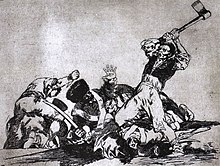War song (Matthias Claudius)
The war song with the famous opening words “It 's war! “Is a poem by Matthias Claudius from 1778. It also appeared - shortened by the last stanza - in 1783 in the fourth volume of ASMUS omnia sua SECUM portans .

Emergence
The poem was published in 1778 in the Vossisches Musenalmanach for 1779. According to popular opinion, it was created on the occasion of the War of the Bavarian Succession ( Austria's claim to Lower Bavaria and the Upper Palatinate after the Bavarian line of the Wittelsbach family died out in 1777 ); Since this war was basically not a war in the sense that Matthias Claudius described its horror, the special nuance and punch line of the poem, according to Reiner Andreas Neuschäfer, lies in the fact that Matthias Claudius just published the poem in a situation without war .
Matthias Claudius was working as a publicist ( Wandsbecker Bothe ) in Wandsbek at this time . During his time, the Prussian-Frederick Wars had changed the map of Central Europe.
content
it's war! it's war!
O God's angel forbid,
And talk about it!
Unfortunately it's war -
and I desire
Not to be at fault!
What should I do when grieving in my sleep
And bloody, pale and pale,
The spirits of the slain come to me
And cried in front of me, what?
When brave men who seek honor
Mutilated and half dead
Rolled in the dust before me and cursed me
In their distress?
If a thousand thousand fathers, mothers, brides,
So happy before the war
Well all miserable, all poor people
Lamented for me?
When hunger, nasty plague and their needs
Friend, friend and enemy to the grave
Gathered and crowed in my honor
Down from a corpse?
What help me crown and land and gold and honor?
They couldn't please me!
Unfortunately it's war - and I desire
Not to be at fault!
interpretation
Matthias Claudius does not glorify war, but portrays it as cruel and painful. He uses sober language and expressions from everyday speech. The phrase "it's unfortunately war" is not seen as a phrase, but as an expression of real sorrow. Karl Kraus unfortunately called this the “deepest comparative of suffering, before which all poetry of suffering vanishes”.
With his statement "I do not wish to be to blame" Claudius takes a clear position against the war. This sentence is at the end of the two marginal stanzas and refers to the previous exclamation “Unfortunately, it's war”.
In the last stanza there is also a criticism of the absolutist bellicism of the epoch. With the verse “What help me crown and country and gold and honor?” The lyrical self names the reasons for war, which in the eyes of the Enlightenmentists since Montesquieu were largely related to the lust for power and thirst for honor of the European monarchs (“gold and honor”).
Others
“It's war!” Is also the title of a poem by Kurt Tucholsky that was banned during the First World War. It starts with the following stanza:
The fat hands clasped comfortably
in front over the bulbous vest,
someone stands by the camp and smiles and thinks:
"It's war! That's the best!
The leather is cleared and the peace is far.
Now do in other Chosen -
The blooming, golden time is still!
The days of roses are still! "
attachment
swell
- ↑ So in Reiner Andreas Neuschäfer: You surround me on all sides. Anthropologie, Göttingen 2009, p. 157.
- ^ Karl Kraus, Franz Werfel , essays on language
- ↑ Transcription on Wikisource
literature
- Reinhard Görisch: "Unfortunately it's war". The "war song" by Matthias Claudius in war and other times. Stations in a history of impact , in: Dirk Kemper (Ed.): Weltseitigkeit. FS for Jörg-Ulrich Fechner , Paderborn: Wilhelm Fink, 2014; ISBN 978-3-7705-5578-9 , pp. 177-201.
- Eckhardt Momber: It 's war! it's war! Attempt on German literature on the war 1914–1933 ; Berlin: The Arsenal, 1981; ISBN 3-921810-50-7 .
- Karl Hotz (ed.): Poems from seven centuries. Interpretations ; Bamberg: Buchner, 1993; ISBN 3-7661-4311-5 .
- Reiner Andreas Neuschäfer: You surround me on all sides. Anthropology ; Göttingen: Vandenhoeck & Ruprecht, 2009; ISBN 978-3-525-77620-9 .
- Reiner Andreas Neuschäfer: Dietrich Bonhoeffer and Matthias Claudius. Traces of the Wandsbeck messenger at Bonhoeffer , in: Dietrich Bonhoeffer Jahrbuch 5 (2011/2012); ISBN 978-3-57901895-9 , pp. 167-187.
- Reiner Andreas Neuschäfer: Unfortunately suffering - responsibility for peace and war atrocities. To Matthias Claudius' "Kriegslied" , in: Reinhard Görisch (Hrsg.): Bright pure pebbles. Poems and prose by Matthias Claudius with interpretations , Husum: Druck- und Verlagsgesellschaft, 2015; ISBN 978-3-89876-797-2 , pp. 115-128.
- Albert Stolpe: Understanding difficulties with Matthias Claudius' "Kriegslied", in: Jahresschriften der Claudius-Gesellschaft 1 (1992), pp. 34–35.
CD
- Knights and ravens (ballads); Otto Sander and the Oakmusic Ensemble, 2007, Patmos Verlag
Web links
- Wikisource: War song (Matthias Claudius) - sources and full texts
- War song (lyrics by Projekt Gutenberg)
- Bernhard Moltmann: - unfortunately it is war - and I do not wish to be guilty of it - (The Peace Ethics Facing New Challenges)